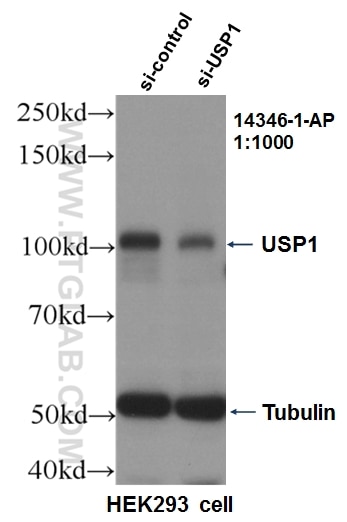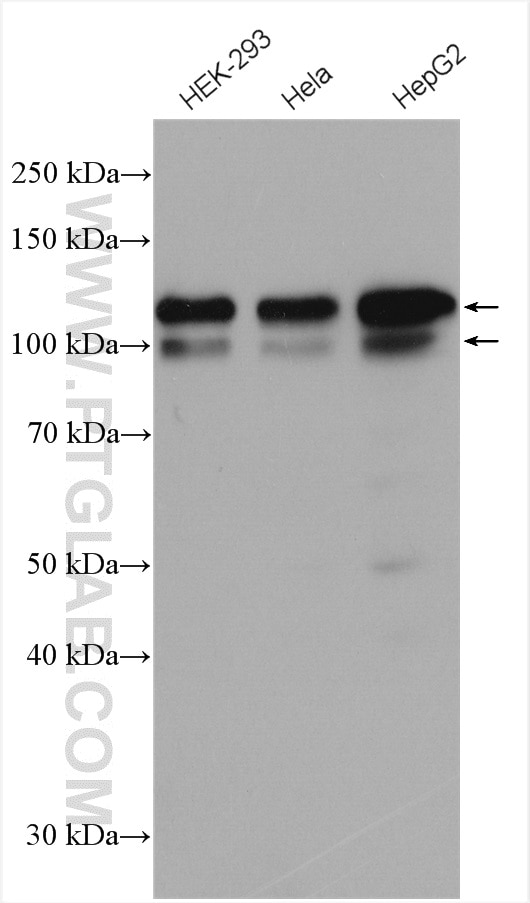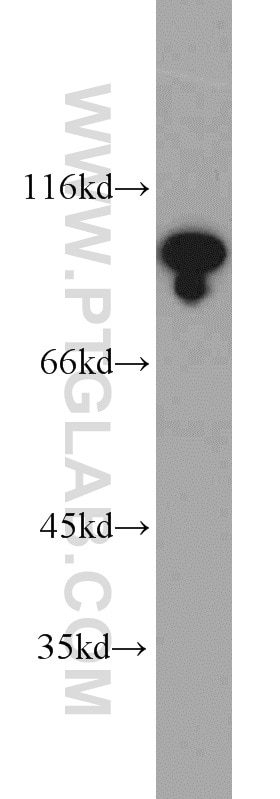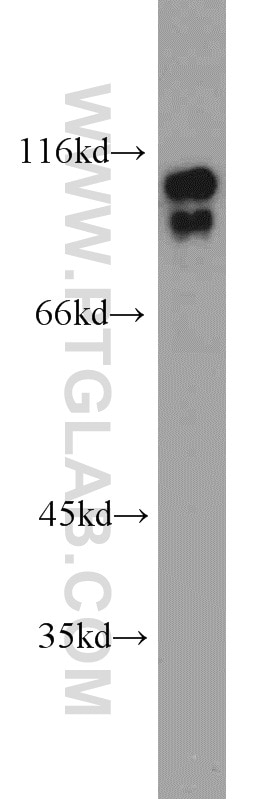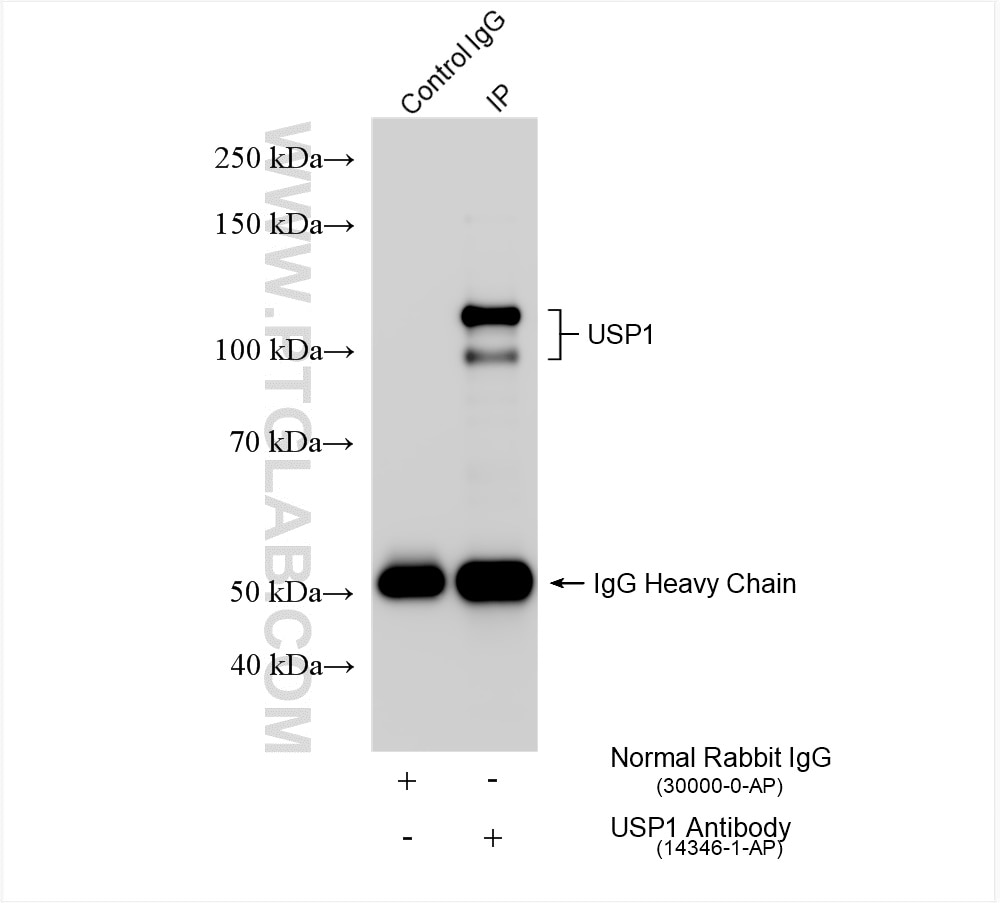- Featured Product
- KD/KO Validated
USP1 Polyklonaler Antikörper
USP1 Polyklonal Antikörper für WB, IP, ELISA
Wirt / Isotyp
Kaninchen / IgG
Getestete Reaktivität
human und mehr (2)
Anwendung
WB, IHC, IF, IP, CoIP, ELISA
Konjugation
Unkonjugiert
Kat-Nr. : 14346-1-AP
Synonyme
Geprüfte Anwendungen
| Erfolgreiche Detektion in WB | HEK-293-Zellen, HeLa-Zellen, HepG2-Zellen |
| Erfolgreiche IP | HEK-293-Zellen |
Empfohlene Verdünnung
| Anwendung | Verdünnung |
|---|---|
| Western Blot (WB) | WB : 1:500-1:1000 |
| Immunpräzipitation (IP) | IP : 0.5-4.0 ug for 1.0-3.0 mg of total protein lysate |
| It is recommended that this reagent should be titrated in each testing system to obtain optimal results. | |
| Sample-dependent, check data in validation data gallery | |
Veröffentlichte Anwendungen
| KD/KO | See 11 publications below |
| WB | See 34 publications below |
| IHC | See 11 publications below |
| IF | See 8 publications below |
| IP | See 8 publications below |
| CoIP | See 2 publications below |
Produktinformation
14346-1-AP bindet in WB, IHC, IF, IP, CoIP, ELISA USP1 und zeigt Reaktivität mit human
| Getestete Reaktivität | human |
| In Publikationen genannte Reaktivität | human, Maus, Ratte |
| Wirt / Isotyp | Kaninchen / IgG |
| Klonalität | Polyklonal |
| Typ | Antikörper |
| Immunogen | USP1 fusion protein Ag5686 |
| Vollständiger Name | ubiquitin specific peptidase 1 |
| Berechnetes Molekulargewicht | 88 kDa |
| Beobachtetes Molekulargewicht | 110 kDa, 100 kDa |
| GenBank-Zugangsnummer | BC050525 |
| Gene symbol | USP1 |
| Gene ID (NCBI) | 7398 |
| Konjugation | Unkonjugiert |
| Form | Liquid |
| Reinigungsmethode | Antigen-Affinitätsreinigung |
| Lagerungspuffer | PBS with 0.02% sodium azide and 50% glycerol |
| Lagerungsbedingungen | Bei -20°C lagern. Nach dem Versand ein Jahr lang stabil Aliquotieren ist bei -20oC Lagerung nicht notwendig. 20ul Größen enthalten 0,1% BSA. |
Hintergrundinformationen
USP1(Ubiquitin carboxyl-terminal hydrolase 1) is a negative regulator of DNA damage repair which specifically deubiquitinates monoubiquitinated FANCD2. It is also involved in PCNA-mediated translesion synthesis (TLS) by deubiquitinating monoubiquitinated PCNA. This protein, which consists of 785 amino acids with a deduced molecular mass of 88.2 kDa, possesses His and Cys domains that are highly conserved in all members of the ubiquitin-specific processing (UBP) family of proteases (PMID: 9806842). The USP1 enzyme can undergo autocleavage, resulting in a 100 kDa N-terminal fragment and a 14 kDa C-terminal fragment (PMID: 18082604).
Protokolle
| PRODUKTSPEZIFISCHE PROTOKOLLE | |
|---|---|
| WB protocol for USP1 antibody 14346-1-AP | Protokoll herunterladen |
| IP protocol for USP1 antibody 14346-1-AP | Protokoll herunterladen |
| STANDARD-PROTOKOLLE | |
|---|---|
| Klicken Sie hier, um unsere Standardprotokolle anzuzeigen |
Publikationen
| Species | Application | Title |
|---|---|---|
Nat Chem Biol A selective USP1-UAF1 inhibitor links deubiquitination to DNA damage responses. | ||
Mol Cell Polyubiquitinated PCNA recruits the ZRANB3 translocase to maintain genomic integrity after replication stress. | ||
Nat Commun The anaphase promoting complex impacts repair choice by protecting ubiquitin signalling at DNA damage sites. | ||
Nat Commun hnRNP H/F drive RNA G-quadruplex-mediated translation linked to genomic instability and therapy resistance in glioblastoma. | ||
Theranostics CRISPR/Cas9-based genome-wide screening for deubiquitinase subfamily identifies USP1 regulating MAST1-driven cisplatin-resistance in cancer cells |
